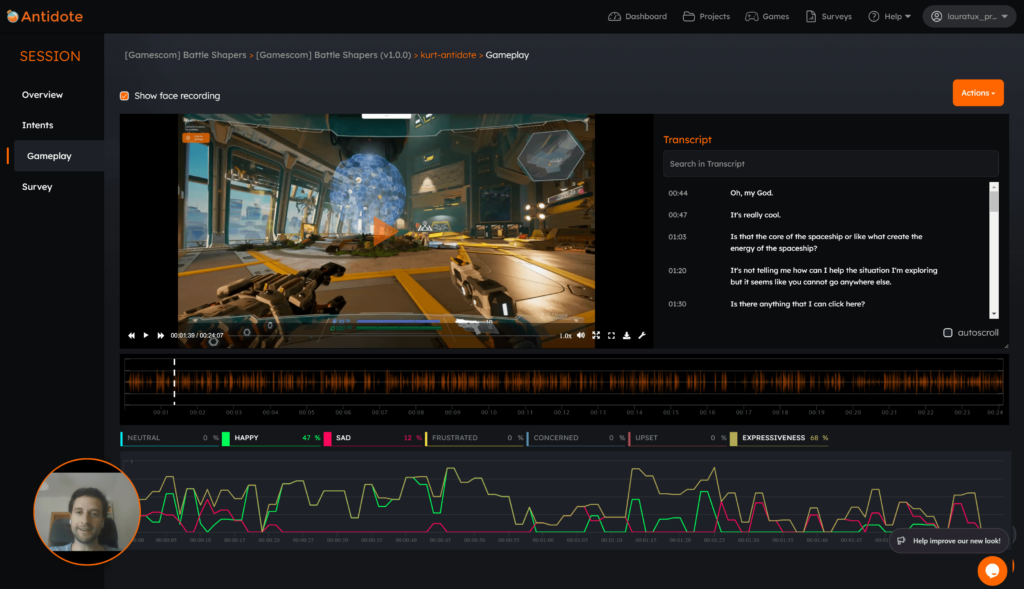Watch the full episode: Addressing Security in Remote Playtesting (Game UX Alchemists Podcast)
In our latest episode, we address the elephant in the room for remote playtesting, which is security.
When studios hear “remote testing”, their first question is usually “but how do we keep our game safe?”
The team (which includes two special guests: Kurt and Mak) breaks down exactly how they handle this challenge with a four-layer security approach.
Antidote’s 4 Layers of Security
Player Confidentiality
Security starts before players even see the game.
The process involves multiple touchpoints where players must explicitly agree to confidentiality terms. At Antidote, players encounter these terms at least three times:
- During the initial recruitment email that includes legal disclaimers
- Through screener surveys where they must actively confirm their understanding of NDA requirements
- Final agreement before players launch the game
For high-security projects, ID verification becomes an additional layer. This can range from automated third-party verification systems for large-scale tests to manual review for smaller projects.
Once verified, players receive a permanent “verified” status that fast-tracks them into future high-security playtests. The team actively works to expand their verified player base through random invitations, creating a trusted community ready for confidential projects.
Secure Game Distribution
The technical backbone of security lies in how games reach players.
The standout feature here is our cloud streaming, where games never actually reach player devices. Instead, players stream the gameplay directly from secure servers, eliminating the risk of build leaks entirely.
This native streaming technology addresses the biggest challenge in game streaming: latency.
By building native components into our platform, participants playtests with near-zero latency even for action-heavy games like FPS titles.
The system automatically pairs players with the closest servers.
Technical Safeguards and SDK Protection
Our native SDK acts like a security plugin for game engines.
It’s surprisingly simple to implement (via auto-injection, meaning no dev help is required) but adds powerful security layers, including:
- Launch protection to prevent unauthorized game starts and ensures games can only be launched through official channels.
- Watermarking adds timestamps, user ID, and IP addresses to gameplay, serving as a deterrent against screenshot or video leaks.
- (for mobile builds only) Screen touches to see how players interact with your game
On PC platforms, additional monitoring watches for malicious processes that might attempt to bypass security measures.
The beauty of this system is its automation, you simply tick a few boxes when uploading builds and the platform handles all technical implementation automatically.
Physical Security Lab
For the most sensitive projects, Antidote operates a dedicated game lab in Barcelona.
This controlled environment offers traditional in-person testing where everything stays within secured premises. All hardware is owned and controlled by Antidote, with local installation and recording eliminating any external data transmission.
Players sign NDAs on-site and streaming is limited to a single controlled PC if clients request real-time observation.
Key Philosophy and Takeaways
The team’s approach to security is refreshingly honest about limitations.
No system is 100% bulletproof, but the goal is creating enough barriers to make unauthorized access increasingly difficult. Each security layer adds friction for potential bad actors while maintaining a smooth experience for legitimate players.
What stands out is how these security measures integrate seamlessly into the user experience. Despite all the backend complexity (from multi-layer NDAs to cloud streaming to automated SDK injection) players simply click “play” and access games within seconds.
The technical sophistication remains invisible to end users.
We hope you enjoyed this week’s episode and got some insights into how we handle security in remote playtesting.
If you want to learn more about the measures, you can check out our in-depth article here.
We’ll see you next time 👋



